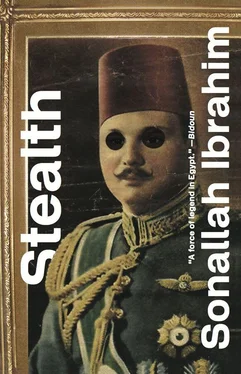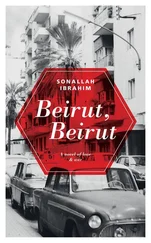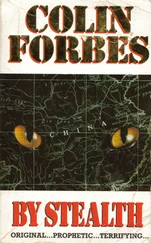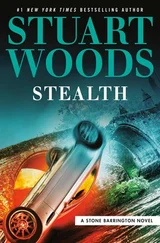Siham, Selma’s older sister, appears at the doorway to their apartment. She’s wearing an indoor gallabiya without sleeves. There is a basket full of laundry on top of her head. She goes up the stairs. I watch the sway of her hips until she disappears.
Selma points to the top story of our house. She asks us if we know what happened early that morning. The police broke into the house and arrested Wadie.
I ask her: “Wadie who?”
“The son of Um Wadie.”
“Why? Is he a crook?”
“No. A communist.”
“What’s that?”
She says she doesn’t know.
“What does he look like?”
I can’t remember ever seeing him. She says he is a university student who was going around to all the houses last year telling people how to prevent cholera.
The wind blows up her dress and she reaches down and pulls it over her knees. She leaves her legs far enough apart, though, that we can still see something. There is a dark space that goes up between them. I notice she is not wearing panties. Mother stretches her hand under her gallabiya . She pulls out a big piece of cloth that is soaked in blood. She goes to the bathroom. She comes out after a little bit. I call her but she doesn’t answer. She looks like she is annoyed. She tilts her head and listens, like some kind of voice has come into her head. She heads to the window. I go over to her carefully. I lie down on the ground and look up her dress, even though I know she is going to be mad. She is not wearing underwear. She pushes me aside.
I put my cards together. I look at Selma. She is looking at the ground, with a serious face. When she raises her head, our eyes meet. She turns her eyes away. My gaze falls back on her legs. You can see even more. I go up to the landlord’s apartment to borrow a pinch of salt. His two girls pass me on the stairs. They ask me in a whisper what my mother was talking about last night when she was screaming at my father. I don’t understand which time they mean. One of them asks me with a smile: “What is this about strands of hair?”I tell her. Their faces go red and they break into muffled laughter.
The ululations ring out from Hakmet’s house. Selma raises her eyes to the balcony up above Safwat’s house. Abdel Hamid, our landlord’s crazy son, is standing there, fully dressed and squeezing a newspaper in his right hand. He looks over at us.
She shows all of her legs, then lets the dress fall again. She stands straight up. She disappears into her apartment. Samir’s mother yells out his name. The voice of Safwat’s mother rings out, calling for him. They leave and the fat boy follows them. I wait there for a second, then I sneak up the stairs to the roof. Its door is shut. I push on it and it opens. A basket of laundry is in the middle. Some of what was in it is hanging on the line. There is no sign of Siham. I go over towards the room of the engineering student. My heart is pounding. The door is shut. I listen but I don’t hear a thing. I put my eye to the keyhole. All I can see is an empty desk, but I hear movement behind the door. I run back to the door to the stairs and I go down in a hurry.
More ululating pours out of the bride’s house. I go up to our apartment. Father sits in the living room. Fatima complains to him about her husband. She says he is always getting drunk on homemade liquor. After that he gets violent and beats her up. Father tells her not to make a big deal of it. He asks her to bring one of the empty cans that the aged cheese comes in. He tells her to wash it well with soap and water, then let it dry. He adds bread crumbs to water to soak them. He adds more water. He sends her to buy beer yeast from the baker. She wraps herself in her black coat and goes out. I stand on the balcony. She comes back with the yeast. Her husband Abbas meets her at our doorway. “Where’ve you been, bitch?” She answers back, confidently: “My boss Sidi Khalil sent me to the souq.”
Father puts the yeast in the can. He stirs it. He tells her to wait three days and then give some of it to Abbas. He says the mixture is called “booza” and that it is good for the stomach and it will give him a buzz too. He says it will help him to get off the liquor. She bends over and kisses his hand: “Our Lord preserve you, Sidi.”
He tells her to move the pillows to the other end of the bed so we can face the balcony and catch a bit of the breeze. I smell herring being cooked. I ask him why they don’t just eat it. He says that it is the food of poor people.
I stand on the balcony. My eye is on the apartment of the bride. A pushcart comes into the alley carrying a big load of chairs and colored curtains like the ones that people use at memorials too. They are carried up to the roof of the building. Father lets me go out. I meet the children gathered around the door to the building. We go up the stairs to the roofs, then come down. The sun goes down and the mantle lamps are lit up. They test the megaphone: “Hello. Hello. One, two, three.” We crowd around the table with the wedding punch. We take the chairs in the front rows and they scold us and chase us to the back. We wait anxiously. Finally, the couple appears at the entrance to the rooftop. Hekmat looks pretty in her wedding clothes. The groom is shorter than her. . fatter too. He wears a black suit and a necktie shaped like a bow. They take their seats on a platform at the end of the roof.
The belly dancer arrives. Short and dark. The drummer starts reciting jingles from the films of Shakookoo and Soraya Helmi. The dancer goes away for a second and then comes back in a dance costume. Her arms are bare. I can see the top of her chest. We clap along. She dances to the song “The Postmen Complain Because of All My Letters.” She circles the wedding couple. She bends backwards as she dances. She puts her head in the groom’s lap. For a second, you can see the top of her thighs. She sits in the front row to rest. One of those sitting in the front gives her a piece of cardboard to fan her head and chest and shoulders with. I sneak between the chairs to get closer to her. I stand right behind her. I reach out and touch her plump arm just below the shoulder. I am expecting it to be hot. I am surprised by its coldness.
Dr. Aziz asks me: “How’d you do in the makeup exam?” Father answers: “He passed, thank God. The main thing is to not have to do it again.” Everyone looks at a plump woman wearing trousers on the opposite pavement. The lights from the shops shine down on her back and make clear the roundness of her bottom. The turbaned sheikh says: “See the old lady that has no shame. Everything’s showing.” The priest slaps his hands together and says: “The world’s gone to hell.” The turbaned sheikh says: “Do you think we lost in Palestine for nothing? That was a punishment from our Lord.” Refaat says: “Our cannons were blowing up in our faces.” Father says: “King Abdullah was colluding with the Jews.” Dr. Aziz says: “The Jewish forces expelled half a million Arabs into Transjordan, Syria, Lebanon, and Egypt and all Azzam Pasha can tell us is that they’ll burn in hell for it.” They laugh.
Refaat is suspicious. He says: “Was our loss in the London Olympics another punishment from God?” Abdel ’Alim says: “Thousands of pounds were thrown at our team and it all went to waste. We should give it the same name as the war, the Olympic ‘Catastrophe.’ Now they’re trying to say we’ll start getting ready right away for the 1952 Olympics.”
The sheikh offers the things he bought for the hajj: a cloth pouch for water to drink and to wash with and a wide leather belt called the kamar that the pilgrim wraps around his waist under his clothes to keep his money in. Father looks impressed by the new shirt that Refaat Effendi is wearing.
Читать дальше












